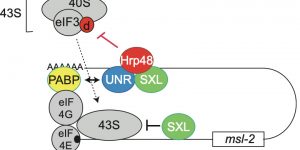Our group is interested in post-transcriptional regulation during embryo development and disease. In particular, we investigate how RNA-binding proteins (RBPs) regulate translation and how this is connected with general cell homeostasis and cancer progression. During this year, we have identified new RBPs with roles in melanoma progression, including enzymes with previously unrecognized roles in RNA metabolism, as well as RBPs that have not been related to cancer progression in the past (work in progress). Regarding mechanisms of translational control, using Drosophila as a model system we have identified a role for the RBP Hrp48 in translational repression via connections with eIF3d, a subunit of the multicomponent translation initiation factor eIF3. This work shows how general translation factors can contribute to mRNA-specific translational control. In addition, we have found a novel role for the RNAi factor Dicer-2 in translation stimulation via cytoplasmic polyadenylation.
Szostak E, García-Beyaert M, Guitart T, Graindorge A, Coll O and Gebauer F.
“Hrp48 and eIF3d contribute to msl-2 mRNA translational repression.”
Nucleic Acids Res, 46:4099-4113, 2018.
Coll O, Guitart T, Villalba A, Papin C, Simonelig M and Gebauer F.
“Dicer-2 promotes mRNA activation through cytoplasmic polyadenylation.”
RNA, 24:529-539, 2018.
Faculty1000 recommended
Abdel-Wahab O, Gebauer F.
“Editorial overview: Cancer genomics: RNA metabolism and translation in cancer pathogenesis and therapy.”
Curr Opin Genet Dev, 48:iv-vi, 2018.
Moschall R, Strauss D, Garcia-Bayert M, Gebauer F, Medenbach J.
“Drosophila Sister of Sex-lethal is a repressor of translation.”
RNA, 24:149-158, 2018.

